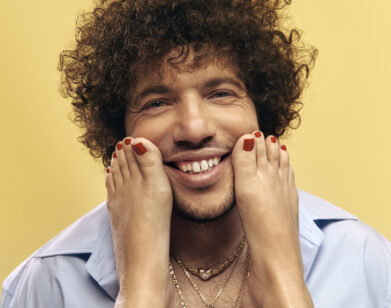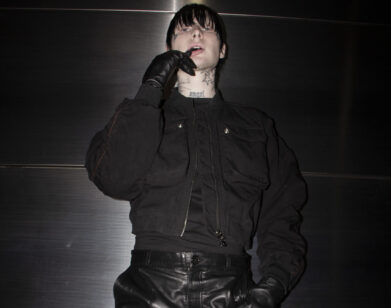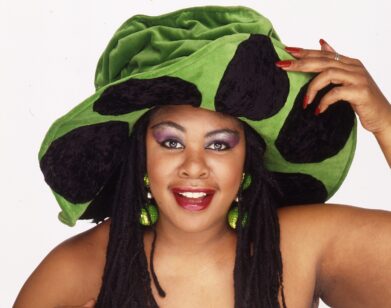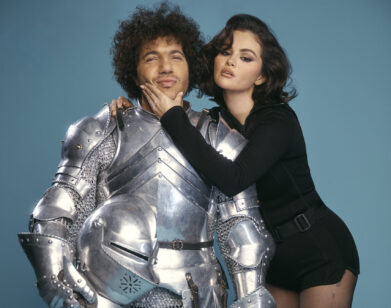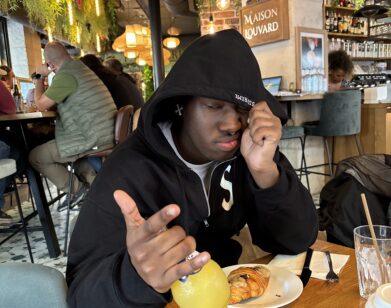One Meeting with Kishi Bashi
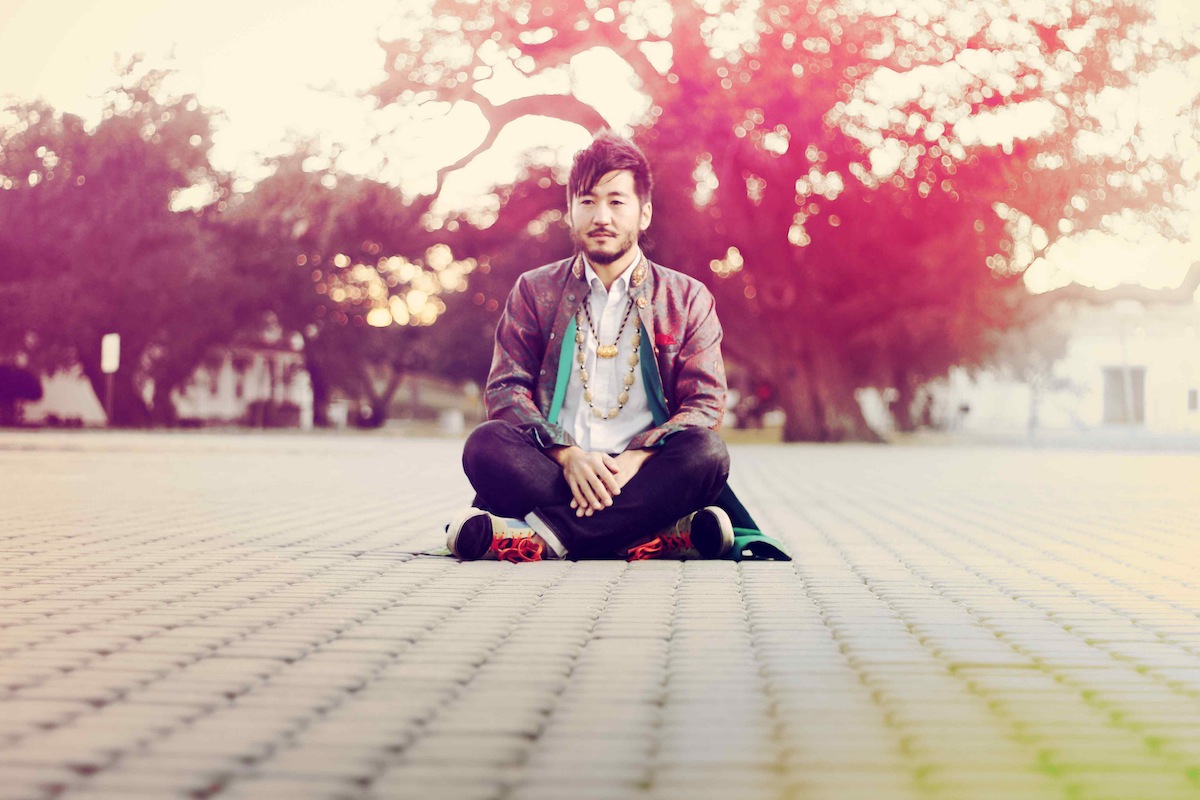
ABOVE: K ISHIBASHI. IMAGE COURTESY OF JENNIFER LEIGH
It’s telling that Kishi Bashi, also known as K Ishibashi, the Japanese-American singer and multi-instrumentalist whom you may have heard NPR gushing about earlier this year, decided to name his debut LP 151a. In Japanese, the title (pronounced “ee-chee-go ee-chee-eh”) translates roughly to “once in a lifetime chance,” or more literally, “one time, one meeting.” And while this may seem like a strange statement coming from someone whose musical credits include touring with indie favorites Of Montreal and Regina Spektor (he is also a founding member of Jupiter One, with whom he still plays), there is an urgency to 151a that is difficult to miss.
Recording primarily on violin and keys, Ishibashi infuses 151a with the spirit of an artist newly awoken. The album’s fourth track, “It All Began With a Burst,” mixes handclaps, electronic blips, and the singer’s ebullient vocals, with irresistible results. The ubiquitous single, “Bright Whites,” bounces along on a Japanese refrain that just might be among the year’s catchiest, if most difficult to memorize. And then there’s “Manchester,” which finds Ishibashi crooning like Paul McCartney over a dissonant violin flurry that sounds straight out of “A Day in the Life.” The record may not mark Kishi Bashi’s first or even last chance at making an impact on the avant-pop landscape, but it’s clear this is one he wants his audience to remember.
No stranger to the road, Ishibashi is currently in the midst of a nationwide tour that sees him playing two shows today at this week’s CMJ Music Marathon. Just hours before his first performance at last week’s Austin City Limits festival, we caught up with the singer backstage to discuss geographic influences, pitfalls of the New York music scene, and the thrill of sounds newly discovered.
JEFF OLOIZIA: Excited for your set today?
K ISHIBASHI: Yeah. It’s a long set for a festival. It’s like an hour.
OLOIZIA: That’s great.
ISHIBASHI: Yeah, it really is. Except The Shins are playing at the same time. So I’m thinking about doing a Shins cover.
OLOIZIA: You should see if you can sync it up to play at the exact same time. [both laugh]
ISHIBASHI: Exactly.
OLOIZIA: Have you played ACL before?
ISHIBASHI: No. I didn’t even know it existed, actually. But I’ve been to Austin a bunch with other bands, and I opened up here for Of Montreal and also Alexi Murdoch.
OLOIZIA: Do you find it a different experience going back and playing the same places you played with a band?
ISHIBASHI: It’s totally different. For some reason, I’m a lot more successful doing this solo thing. [laughs] It was always a struggle with my band to get people to come to the shows, but somehow with this it doesn’t seem to be as hard.
OLOIZIA: I suppose that’s a good thing.
ISHIBASHI: Yeah. I mean, not for the rest of the band, but it’s a good thing. I don’t have to hustle as hard.
OLOIZIA: And do you still promote your own shows?
ISHIBASHI: I’ve been around the block, I guess they say. I had a band who were signed, so I’ve been through that whole thing. It’s tough, man, being a band touring America from New York City. It was so expensive, and there’s just a false sense of industry in New York. You think you’re connected, but then you go outside and it’s hard to get people to come to your shows. It’s really hard.
OLOIZIA: New York crowds, in general, seem really difficult.
ISHIBASHI: Yeah, they’re tough. You’re competing with a lot of different entertainment every night, and they’ll never stay for other bands.
OLOIZIA: You’re not from New York, though.
ISHIBASHI: No. I was born in Seattle, and grew up in Norfolk, Virginia and, like, upstate New York.
OLOIZIA: And obviously there’s a heavy Japanese influence in your music.
ISHIBASHI: I’m Japanese-American, and my wife’s Japanese. So that kind of helps.
OLOIZIA: How do you find that aspect of your heritage influences your songs?
ISHIBASHI: I didn’t really embrace it until this album. I was insecure about it, and I wanted to be in an American band, whatever that means. I just had a lot of insecurities, which I kind of overcame with this album, and now I’m really honest about the stuff I put in. I play the violin, which I was embarrassed about it. You know, no one in a rock band plays a violin. But I found that it’s actually really exciting; the textures I can get with it are far more exciting than guitar. And then I started incorporating Japanese, which I use as a tool to kind of add excitement to my recordings.
OLOIZIA: In what way?
ISHIBASHI: I think it sounds kind of magical, or at least definitely exotic. The language is also very percussive, so you can really use it to add that dynamic to the music. I’m into African music, too, but I was trying to really limit my musical range to voice and violin. I mean, obviously the album is more than that, but instead of making up some meaningless African words or gibberish or just using English… English sounds almost cheesy like that, you know?
OLOIZIA: Have you played any shows in Japan yet?
ISHIBASHI: Yeah, I just played a show in Tokyo last month, and my album is coming out there in December, so I’ll go back then.
OLOIZIA: How has the response been?
ISHIBASHI: Pretty good. I’m really just getting started over there, but people seem genuinely excited. There were about a hundred people at the first show.
OLOIZIA: That’s great. How do you find the crowds compare to those in America?
ISHIBASHI: Like, not as drunk? Is that what you mean? [laughs] That’s the only way to explain it. They aren’t as drunk as Americans.
OLOIZIA: I remember watching several bands play their first shows in Japan, and I think they were a little taken aback by the response. The audience is so quiet.
ISHIBASHI: Well, they’re listening. They’re never, like, “Yeah!” but they are listening. It’s weird, but you just have to know that they’re actually appreciating it.
OLOIZIA: You mentioned before that you really tried to keep this record to just violin and voice. Can you walk me through your instrumentation, both on the record and onstage?
ISHIBASHI: For my live show, I’ve kind of limited myself to the violin and voice. I also beatbox, so I make the beats and then add violin loops and sing over it. On the albums, I play guitar and keyboards, a lot of analog synths—I’m into old synthesizer sounds. I think I had a drummer for percussion roles and stuff like that, but I played just about everything on the record and the rest of [the sounds] are programmed.
OLOIZIA: What are the particular challenges of writing on violin as opposed to piano or guitar?
ISHIBASHI: Well, it’s not a very rhythmic instrument. It’s not a chordal instrument. But it opens up a lot of subtlety, and you can really get to the core of a song. There’s never going to be a heavy beat to give you that false sense of, like, “Oh, this song’s awesome.” And because there’s no beat, you really have to focus on the melody. So I think that’s kind of challenging. It also opens up new textures, which is different for me because I used to bang them out on the guitar or piano before.
OLOIZIA: But you’re not working completely without rhythm or bass?
ISHIBASHI: Well, now I’m starting to write with my beatboxing, which is really kind of exciting. Beatboxing is something that comes easy for me, so I can create songs and experiment really rapidly. I’m a firm believer that the more ideas you have, the better the material you have to pick from, so I try to experiment as much as possible. I think that’s what made my album sound a little different than the typical indie-rock album.
KISHI BASHI PLAYS UNION SQUARE BALLROOM AND THE STANDARD, EAST VILLAGE TODAY AS PART OF CMJ MUSIC MARATHON 2012. 151a IS AVAILABLE NOW ON JOYFUL NOISE. FOR MORE ON KISHI BASHI, VISIT HIS WEBSITE.

